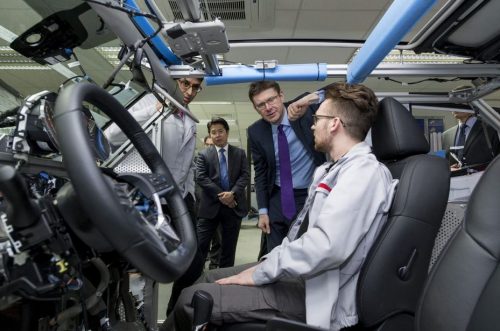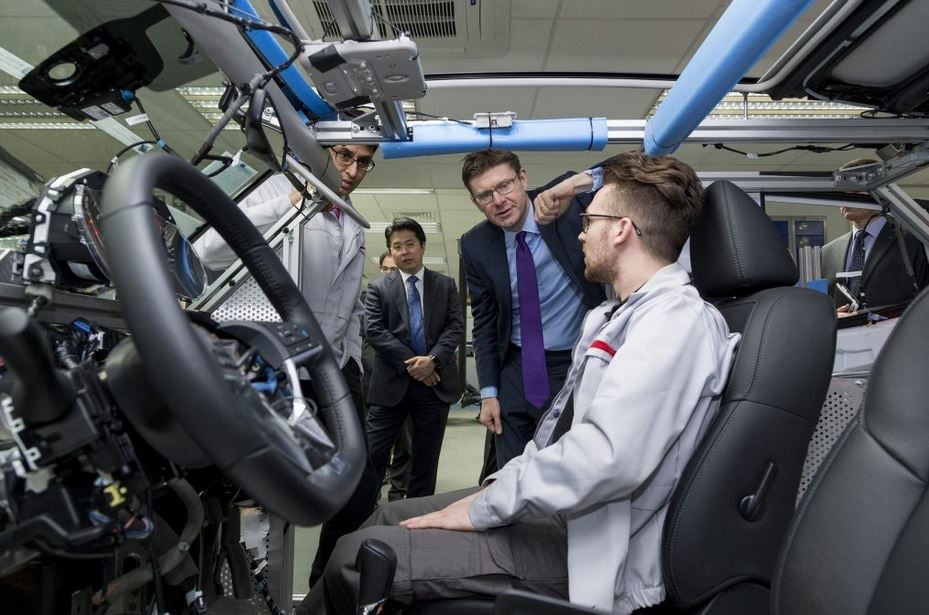The United Kingdom parliament is currently debating legislation that will extend the requirement for motor insurance to include owners of self-driving vehicles. When it becomes law, insurers will be liable for accidents caused by self-driving vehicles of insured owners in the same way as they are currently liable for accidents caused by insured drivers of normal cars.
Self-driving vehicles will allow motorists to hand over full driving control and responsibility when automated technology is turned on.
 Nissan are demonstrating self-driving vehicles on the roads of London next month. Image: Nissan
Nissan are demonstrating self-driving vehicles on the roads of London next month. Image: Nissan
Chris Grayling, transport secretary and sponsor of the Vehicle Technology and Aviation Bill, says:
“Automated vehicles have the potential to transform our roads in the future and make them even safer and easier to use, as well as promising new mobility for those who cannot drive.”
“But,” he adds, “we must ensure the public is protected in the event of an incident,” explaining that the new bill introduces the legislative framework to allow insurance for self-driving vehicles.
The new measures will allow a single insurance product to cover both the motorist when he or she is driving and also his or her car when it is in self-driving mode.
This means innocent victims involved in a collision with a self-driving vehicle will be able to claim damages quickly and easily.
Insurance industry in favour of automated vehicles
The insurance industry welcomes the new bill. Ben Howarth, senior policy adviser for motor and liability at the Association of British Insurers (ABI), comments:
“We welcome the release of the new Vehicle Technology and Aviation Bill because it demonstrates the Government’s clear commitment to moving forward when it comes to automated vehicles. As an industry, we want to keep insurance as straightforward as possible, which is why insurers proposed the simple approach which the Government is now taking forward.”
He says the insurance industry is 100 percent in favour of the development of automated vehicles. The technology has the potential to “dramatically improve road safety and revolutionize our transport systems,” he adds.
Encouraging carmakers to test self-driving vehicles in the UK
The government says it hopes the new measures “will help the UK to become a world leader in these technologies by breaking down some of the barriers that could limit companies from testing them here.”
Meanwhile, carmaker Nissan have announced they are demonstrating self-driving vehicles on the roads of London next month.
Passengers will include government officials, technical and safety experts. They will ride in a modified Nissan LEAF where they will experience and test the technology in “a live environment.”
Paul Willcox, Chairman of Nissan Europe says: “In just a few weeks’ time, there will be Nissan LEAFs driving on the streets of London using our autonomous driving technology.”
Transition to self-driving vehicles
Experts suggest the transition to fully driverless vehicles over the next decade will likely proceed in stages.
Stage 1 – hands-on assisted driving: this is with us already. The technology includes cameras that monitor potential road hazards, autonomous emergency braking, lane departure monitoring, and low-speed driving assistance. The driver is in control of the vehicle and keeps hands on steering wheel.
Stage 2 – hands-off assisted self-driving, 2018. Cars will be smarter with systems that allow hands=off driving on motorways, in line with regulations. Drivers will be able to take hands off the wheel for a few minutes at a time.
Stage 3 – automated driving, 2021. There will be designated sections of motorway where drivers will be able to surrender complete control to the car’s autonomous self-driving system and pay attention to other things. Arrays of cameras, sensors, radars, lasers will keep on-board navigation systems up to date.
Stage 4 – fully autonomous vehicles, 2025. The experts predict in a decade from now, the self-driving car will be taking people from door to door without a driver having to touch a steering wheel. Cars will be communicating with each other as well as analyzing their environment.
After that, it has been suggested self-driving vehicles will not even have steering wheels. In fact, one automation expert in the United States predicts that children born today will never get to drive a car.

